Understand Proof Of Governance (POG)
This article will help you to understand POG and how important it is to developing Spur protocol chain
Go Back

🕒 4:45 AM
📅 Apr 15, 2025
✍️ By Deekahdavipersaint
"Proof of governance" refers to demonstrating the effectiveness and adherence to principles of good governance within an organization or system. It involves showcasing how an entity operates transparently, ethically, and responsibly, while ensuring accountability and fairness. This concept is applicable to various entities, including companies, governments, and even decentralized systems like those using blockchain technology.
Key aspects of proof of governance include:
- Transparency and Accountability: Openly communicating information and ensuring those in positions of authority are responsible for their actions.
- Ethical Conduct: Adhering to ethical principles in decision-making and operations.
- Effectiveness and Efficiency: Demonstrating that governance structures and processes are working effectively and efficiently.
- Fairness and Inclusiveness: Ensuring that all stakeholders are treated fairly and that their voices are heard.
- Compliance: Adhering to relevant laws, regulations, and industry standards.
Examples of proof of governance in action:
> Corporate Governance:
Companies demonstrating their commitment to good governance through board structure, ethical codes of conduct, and transparent financial reporting.
>Public Sector Governance:
Governments showcasing their commitment to transparency, accountability, and the rule of law.
> Blockchain Governance:
Decentralized systems using blockchain technology demonstrating how they ensure fair participation, transparency, and security through mechanisms like governance tokens and voting processes.
> Organizational Governance:
Internal processes and systems designed to ensure ethical and responsible decision-making and operations within an organization.
In essence, "proof of governance" is about demonstrating the effectiveness and legitimacy of governance structures and processes, ensuring that an entity is operating in a responsible and accountable manner.

